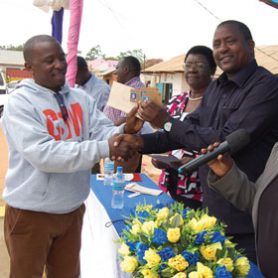Creating wealth in Tanzania

Songea, the capital of the Ruvuma Region in southeastern Tanzania, is predominately an agricultural area. The district takes its name from a Ngoni warrior who was hanged in 1906 when the country was still under colonial rule, but today it’s home to a thriving trade initiative driven by the Covenant Bank for Women (Tanzania) Ltd.
The Ngonis of Songea in Tanzania traditionally grow maize, coffee, tobacco and cashew nuts, however in the 1990s, to improve their diet, they began keeping livestock. Two years ago, residents established a firm that’s now known as Ruvuma Fresh Milk Company. However, the company could not produce enough milk to meet the market demand, compelling the management to seek assistance from financial institutions.
“We went to several banks but it was to no avail, until such a point when we came up with the idea of approaching Covenant Bank for Women Tanzania, and frankly speaking, the bank came in very handy,” says the Ruvuma Fresh Milk Managing Director, Cornel Kapinga.
After a few days of discussions and fine-tuning the business plan, Covenant Bank for Women issued a loan that enabled the company to obtain a total of 200 dairy cows to its group dairy farmers and according to Kapinga, so far, the progress has been smooth.
Milk production has since increased tremendously. “With our partnership with Covenant Bank for Women, we are now confident that the business will soon flourish,” Kapinga says. Already, the company is selling milk within Songea and the surplus is sold to Dar es Salaam and in other regions.
The Songea-based company is just one of hundreds of micro-businesses, women and youth entrepreneurs, savings and credit cooperatives societies (SACCOS) who have benefitted tremendously from Covenant Bank for Women’s innovative loan schemes. Others include a number of schools and colleges, village cooperative banks, informal sector entrepreneurs, salaried employees, dairy cattle farmers and agri-business players.
The bank’s award-winning Hub and Spoke financing model has seen the Dar es Salaam-based Somangira livestock farmers, as well as thousands of other farmers in several regions, expand their businesses after getting a much-needed capital boost. These small and medium-sized enterprises are also able to get solar energy loans that enable them to succeed in the poultry and dairy farming business.
The Covenant Bank for Women also endeavours to contribute towards the United Nations’ Sustainable Development Goals, especially those combating climate change and its impacts by regulating emissions and promoting renewable energy. The bank therefore gives loans for solar energy and supports biogas projects for women and youth farmers.
Encouraged by a 2006 study by a renowned Peruvian economist, Professor Harnando De Soto, which showed that Tanzania’s extra-legal (informal) economy accounts for assets worth $29bn. Covenant Bank for Women believe that the best way to significantly lift Tanzania’s economy is by nurturing the growth of small businesses, including those that operate informally. With a specific focus on micro, small and medium-sized enterprises, women and those who are impoverished, Covenant Bank for Women Tanzania is paving the way for change.
Providing access to opportunity
Driven by its values of integrity, commitment, transparency, tenacity, competitiveness and willingness to innovate, the bank’s loan products are accessed by people who would not be able to get them under a traditional banking system. In partnership with other service providers, the Hub and Spoke Model helps the bank provide entrepreneurs with quick access to all they need. This is because the model provides the entrepreneurs and farmers access to all financial and non-financial services.
Sabetha Mwambenja“With our Hub and Spoke financing Model, we are able to provide or facilitate accessibility of various other none financial services to women and other entrepreneurs,” says Covenant Bank for Women’s Tanzania Managing Director, Dr Sabetha James Mwambenja.
The bank also facilitates entrepreneurs’ operations with pension subscriptions, health insurance plus personal accident insurance to fishermen and motorcycle drivers. It also offers livestock insurance as well as boats and ship insurance. Covenant Bank for Women Tanzania also finances the production, processing and marketing of various value chain products.
This is why business management training as well as offering services that help farmers to get livestock feeds and other veterinary services, ranks high on the bank’s operations.
“This is why we fully engage in financial services deepening with a view to reforming the financial sector through innovations of services that are suitable for the informal/micro women and young entrepreneurs in order to empower them economically,” says Dr Mwambenja.
The Chairperson for the board of directors of the Covenant Bank for Women Tanzania, Ambassador Salome Sijaona says the financial institutions always strive to design a financing model for reforming and empowering the informal/micro women and young entrepreneurs at the bottom of the economic pyramid.
With its unique financing model, Dr Mwambenja believes Covenant Bank for Women Tanzania has now been able to create its own collateral and therefore does not make demands from its clients. It has also helped to increase the creation of jobs for youths through entrepreneurship while expanding the reach of financial services, such as pension and accident insurance to an increased number of Tanzanians.
“It is based on such innovative services that Covenant Bank for Women Tanzania started registering profits during the first quarter of its second year in operations. Basically, most new banks register losses until three years down the line, when they eventually break even and start operating profitability. Our story is different, we started registering profits after being in business for only one year,” says Dr Mwambenja who steers the bank under guidance of a five-member board led by Chairperson, Ambassador Salome Sijaona.
Further information
www.covenantbankforwomen.co.tz


